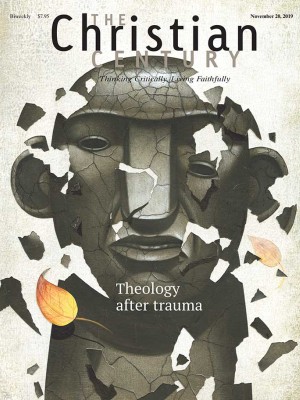Why did Lyz Lenz’s church fail? Why do so many others?
The former church planter’s melancholy journey through the Midwest and its faith
“Middle America resists representation,” writes Lyz Lenz. Not because it’s bland or passive, but because it’s “a dissonant space, pulled between the extremes of the coast,” built on a precarious tension between contradictions and opposites. Never was this complexity clearer to Lenz than in the aftermath of the 2016 presidential election. As her marriage crumbled, she set out on a quest to learn “why churches across America are failing.”
Lenz begins by reflecting on her own experience with a failing church. In 2010, she tried to plant a church called Stonebridge with the help of her husband and six other people. Lenz envisioned a church where women could be pastors and gay people would be welcome. But she was met mostly with silence by her fellow planters. The pastor directing the effort simply berated her for not updating the church’s website.
Read our latest issue or browse back issues.
Four years into the plant, things began to unravel. The pastor told Lenz she lacked faith for not supporting his plot to take over a Methodist church for Stonebridge. “No amount of faith is gonna justify a coup d’etat on aging Methodists” was her wry response. After being labeled as an emotional woman and reminded by her husband that she was not an elder, Lenz relinquished her dream. Stonebridge closed, and she gave away her ministry materials, taking what was left to the dumpster, “like so many offerings of failure.”
What did Lenz learn from this painful experience? “It’s a very colonizing impulse to look at something—a land, a city, a culture—and instead of seeing what is there, see a barren landscape that needs your new ideas.”
Lenz paints vivid pictures of the complex landscapes she sees on her journey through the Midwest. She describes the heartbreak of churches that have closed or are barely limping along. She goes to a rural ministry conference, where the midwestern pastors tell her the biggest problems they face are sports and politics—sports because they take place during worship hours on Sunday mornings, and politics because the pastors often hold political beliefs different from those of their parishioners
She participates in a weeklong training with the Rural Home Missionary Association, an evangelical nonprofit organization that prepares people for ministry in rural areas. She’s one of four women in a class of 12, and the instructors comment that they’ve never had so many women present. She’s shocked when they advise carrying a gun while preaching. “A gun is a pastoral aide,” one instructor explains. The lone female pastor in the class, who is a veteran, tells Lenz she’s faced far more patriarchy in the church than she ever did in the military.
In a more upbeat chapter, Lenz describes a virtual church founded by Gen Xer Angela Herrington called Broken, Beautiful, Bold. With 65,000 followers, most of whom live in the middle of the country, the website “operates like a church community for women seeking a place to practice their faith and discover their spiritual calling.” Herrington is reluctant to become ordained, Lenz explains, because “she values her role as an outsider.”
After describing a number of other virtual Christian communities, Lenz writes about the support she found in an email thread with friends after the demise of Stonebridge. This online community helped Lenz realize how much her church’s failure had to do with misogyny. “These tiny little churches of women that connect through the air are weird, radical, and haphazard,” she writes, but they have “the power to change” people and communities.
Lenz’s chapter on football culture begins with a tailgate party at the University of Iowa. The tailgate event feels like a liturgy to Lenz, and she finds herself getting “lost in the drunken religiosity.” At the same time, she’s aware that her gender limits her role. As a woman, she can only cheer from the sidelines. She contrasts football culture with that of the Lutheran church she attends after the collapse of her marriage—a church with a rainbow flag and a female pastor, where she doesn’t feel pushed to the sidelines.
Lenz ends the book with a scene in this same church. After journeying with her through failing churches, divorce, patriarchy, and gun culture, it’s a relief for the reader to land with her in a space where she can honestly project some hopefulness.
But there are also hints of hope earlier in the book. My favorite scene happens just after Lenz files for divorce and moves out of her house. A friend’s father offers to bring her a secondhand chair, and she’s surprised when he shows up with a new leather chair instead. They both know that he’s more politically conservative than she is, and he awkwardly jokes about the “resist” sign she’s put up on the wall. When he leaves, she gives him a box of Girl Scout cookies.
The next day he sends her a picture of the cookies shaped into the letters R-E-S-I-S-T. Lenz finds herself weeping over “the hilarity and kindness” of this gesture. She explains:
This feels the most like a Christian thing anyone has done for me in a while. He is a stranger who, because of the nature of the Midwest, knows me, knows all about my mistakes and my mess, who might even fundamentally disagree with my politics, but here he is, generous and kind, reassuring and self-effacing.






